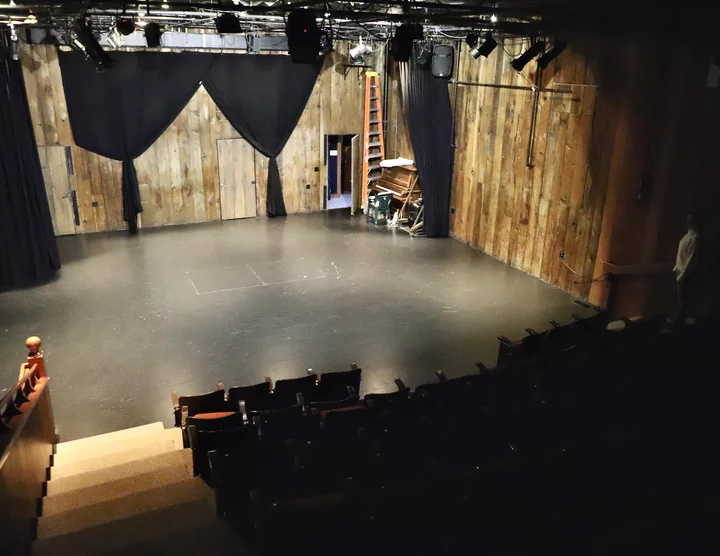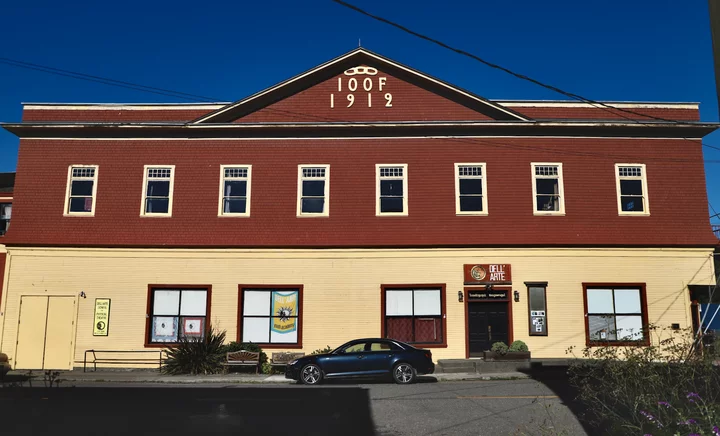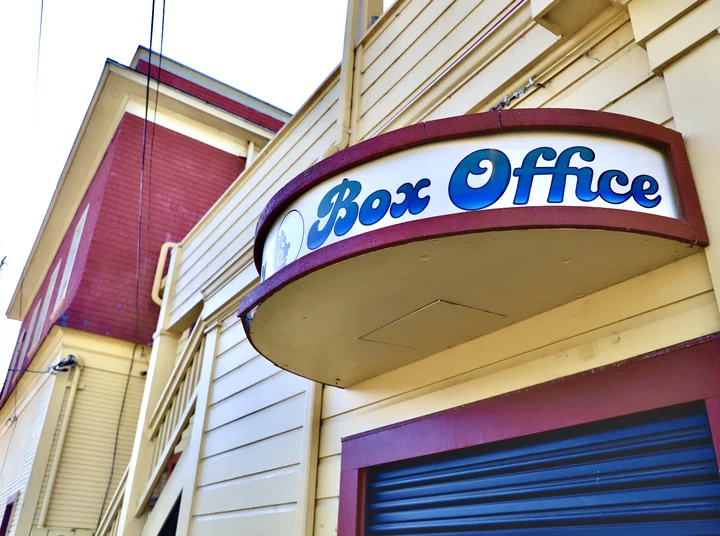Dell’Arte International, a world-renowned theater company and school nestled in the heart of Blue Lake, faces closure. Photos by Andrew Goff.
###
The dedicated performers at Dell’Arte International have shared the improvisational stylings of traditional Italian theater, known as commedia dell’arte, with local and global audiences for nearly 50 years. However, fiscal turmoil has placed the legacy of the world-renowned theater company and its school in jeopardy.
The organization laid off all but three of its staff members at the beginning of this month, citing “critical cash flow issues” and “significantly reduced audiences” as the impetus for the sudden realignment of the organization.
The Board of Directors subsequently launched a campaign to save the famed theater, with hopes of raising $125,000 by the end of the year. If they don’t reach their goal, Dell’Arte could face permanent closure.
How did this happen?
Dell’Arte’s financial struggles “are nothing new,” said Jane Hill, who co-founded the theater with Carlo Mazzone-Clementi in the early 1970s.
“It comes with the territory,” Hill told the Outpost during a recent phone interview. “When you talk about financial struggles and financial issues … there’s always been a bit of limping along and learning as you go as circumstances change. Over the years, there have been many times when there has been some crisis that had to do with finances.”
Michael Fields, one of the core members of Dell’Arte’s original crew, wrote many of the grants that funded Dell’Arte over the years. But as time went on, those funds dried up.
“Michael was a brilliant grant writer,” Hill said. “He formed a long-standing relationship with the James Irvine Foundation but eventually [the foundation] began shifting their perspective of philanthropy and what they were going to fund. The relationship that Michael had nurtured for years dried up, and other large foundations shifted in the same direction as time went on.”
The COVID-19 pandemic exacerbated many trends that had long challenged small and regional theaters. Dell’Arte was no exception, said Alyssa Hughlett, Board President and Producing Artistic Facilitator at the theater.
“You can broadly cite pre-pandemic factors such as changes in state, federal, and private foundation funding sector, institutional budget cuts, de-prioritizing arts and culture, enrollment declines in higher education, and state legislation like AB 5 – which went into effect in January 2020 causing a 20 percent hike in theater costs throughout California – as playing a significant role in the situation at large,” Hughlett wrote in a recent email to the Outpost.
When the statewide stay-at-home order was issued in March 2020, Dell’Arte transitioned its students to virtual learning and postponed all upcoming performances, cutting off a major funding source for the organization.
Dell’Arte’s Carlo Theater sits empty.
In the months that followed, Dell’Arte faced yet another challenge: racial equity and diversity within the organization.
As Black Lives Matter and racial justice demonstrations spread across the nation in the summer of 2020, Dell’Arte took to social media to publicize their support for the movement, writing in a June 2, 2020 Facebook post, “We stand in solidarity with Black Lives Matter. … As a predominantly white organization, we are committed to listening, learning and unlearning.”
In another statement posted a few days later, Dell’Arte said its staff and board members would “continue reflection and education, collectively and individually, on what it means as a primarily white organization to dismantle white supremacy.”
That didn’t bode well with some of the organization’s staff. In a letter posted to Facebook, nine current and former staff members criticized the theater’s leadership for failing to “competently lead the organization in matters related to equity,” as reported by the North Coast Journal. They claimed Dell’Arte’s failure to prioritize equity within the organization had created “an unsafe environment” for BIPOC (Black, Indigenous, People of Color), fueling concerns of “fear, retaliation, constructive terminations, and mental and physical stress every time we have voiced concerns.”
The board of directors responded with a letter acknowledging “that people have been hurt in many ways by white supremacy culture and by Dell’Arte’s unintentional complicity,” but maintained that Dell’Arte was “striving to be an anti-racist organization.”
To address the community’s concerns, Dell’Arte contracted with an external auditor to evaluate the organization’s racial environment. A few months later, the organization decided to revise term limits and recruit new board members “to bring greater equity and representation to the board,” per the auditor’s recommendation.
The new bylaws, which set a term limit of seven years, forced several long-standing board members to step down, though most transitioned into advisory or ambassador roles to support the remaining and incoming board members, according to a press release issued in November 2020. The new bylaws also required 50 percent of the board to be BIPOC and LGBTQIA+.
A lot of folks felt the move was a step in the right direction. Others, including Fields, felt the move fractured the organization, ostracizing some of the theater’s most loyal patrons.
“Dell’Arte had an audience, a very faithful audience,” Fields said. “Was it very white? Yes. Was it old? Yes. But it was faithful. They were donors, they came to our productions, and they financially sustained the organization. But they were left behind. What could have helped was an invitation: ‘Come with us. … We don’t know exactly where we’ll land, but please stay with us.’ That invitation wasn’t extended in the way that people felt welcome to come, and I think that hurt [Dell’Arte] because that’s your donor base. Your audience is your donor base.”
Dell’Arte International’s main building, formerly Oddfellows Hall.
Dell’Arte’s troubles continued as the pandemic persisted. In May of 2021, Dell’Arte made the difficult decision to end its Master of Fine Arts Program (MFA) – one of the first accredited physical ensemble-based theater programs in the world.
Hughlett, a graduate of the MFA program, said the school could no longer “sustain the higher bottom line costs” of running a three-year MFA program during the pandemic. “We did not want to be in the even harder position of having to close and teachout the program midway through the three-year program,” she explained. “Additionally, accreditation standards and parameters … do not allow for postponement for over one year.”
The loss of the MFA program took another dig at Dell’Arte’s already precarious financial situation. As the months wore on, COVID-19-era grants kept the theater and school afloat, but eventually, the grant funding dried up.
“The pandemic-era grants that were getting us through that time have pretty much stopped at this point,” Tony Fuemmeler, Dell’Arte’s interim head of training programs and core mask faculty, told the Outpost in a recent phone interview. “That change in funding sources as well as the slow return of the audience to our theater has hit hard. … Since [COVID], there has been a large change in our audience, not only in whether they go or don’t go to [productions] but in their relationship with cultural organizations.”
The persistent financial strain forced Dell’Arte to lay off all but three of its faculty members at the beginning of this month, leaving only a small group working at reduced hours to offer classes and workshops.
The Prison Arts Program at Pelican Bay Prison receives support from the California Arts in Corrections Program and is fully funded for the time being, according to Program Director Janessa Johnsrude.
“We will continue offering the program for as long as we can,” Johnsrude said. “We’ve got projects coming up with our participants and a solid year of programming ahead. We remain dedicated to offering classes to our participants.”
Emma Dobbins was let go during the recent layoffs. During her time with the organization, she served as Stage Manager and took on some of the responsibilities of Production Stage Manager, she said.
Dobbins knew Dell’Arte was “in a bad spot” but said she was actually laid off “about a week and a half before [the] layoffs would take place,” adding that outgoing staff “weren’t afforded forty hours per week for the final paycheck.”
“I’m not sure what was done to try to stave off layoffs – if anything – but I believe that the non-existent and gatekeeping Board [of Directors] was the culprit entirely for the financial downfall,” Dobbins wrote in an emailed response to the Outpost. “For instance, when we – the staff and production team – tried to make money for [Dell’Arte] over the summer, the correct channels apparently were never crossed with the board … even though somehow we were cleared financially for the entire event to take place, and we were then told off by the board for trying to help make money for the organization after the fact. … [The board] should be very ashamed for taking such a back-foot approach to finance raising … and, in my informed opinion, essentially letting Dell’Arte sink.”
Dobbins emphasized that her comments did not apply to the current faculty who have recently joined the board, including Hughlett, Fuemmeler and Julie Douglas, the theater’s head of arts engagement.
Board Chair Pat Bitton declined to comment on specific personnel issues within the organization, but credited the Leadership Council (which includes the remaining staff and board members) for managing the layoff processes “transparently and responsibly.”
“I have never personally been aware of board members ‘telling off’ staff,” Bitton wrote in an email to the Outpost. “[T]he Leadership Council is responsible for staff management, not the board. I can’t personally speak to how board meetings or board-staff interaction functioned before I joined the board [in 2022], and quite frankly, our time now is more effectively focused on the forward evolution of the organization.”
Speaking on behalf of the board, Bitton offered her gratitude to the community for the recent outpouring of support, “both emotional and financial,” and emphasized Dell’Arte’s commitment to developing a “sustainable model of training and production for the future.”
‘This fundraiser is the bridge to our future.’
Libby Maynard, former chair of Dell’Arte’s Board of Directors, initiated the “Save Dell’Arte” campaign with a $5,000 donation. The organization hopes to raise $125,000 by the end of this year. As of this writing, Dell’Arte has raised $45,380.
What happens if they can’t raise the funds in time?
“Humboldt will lose the only professional theater between San Francisco and Ashland, Oregon and Dell’Arte’s unique footprint as a ‘theatre of place’ created in ensemble, expressed through the body,” Hughlett said. “The community will lose a partner and advocate for cultural enrichment.”
What would closure actually look like? Would certain programs be prioritized above others? Would Dell’Arte sell or lease its building, formerly Oddfellows Hall, in Blue Lake?
Unfortunately, staff couldn’t speak to specifics.
“The fundraiser is the bridge to our future,” Douglas said. “It will help us maintain essential daily activities, seek sustainable revenue paths for the future and build our programming back slowly. It also allows us to keep the doors open and the lights on. Without it, our ability to successfully restructure is greatly diminished. We are focused on reaching our goal, but it is just the start of a new beginning. … Dell’Arte has evolved since its beginning. This time is no different.”
Similarly, Fields felt the difficult situation presented an opportunity for staff to transform the theater and school.
“I feel really tender towards the staff members that are trying to work through this right now because they’re in uncharted territory and they can’t recreate what was and yet they don’t know what it is going to be,” he said. “You know, don’t get caught up in trying to make an organization that looks like the perfect thing because it doesn’t exist and it never will. You’ve got to go with your heart and ask, ‘What do we want to be? Where do we want to go?’”
Evolution has been at the heart of Dell’Arte since the very beginning, Hill said. Change is inevitable and it is important, she said, but “we need an honest theater company to keep us looking at ourselves.”
“Dell’Arte is a rich part of our community, and we shouldn’t lose it,” she continued. “I just hope we can rally everyone and help them to understand why this unusual treasure of Humboldt County must not be allowed to die. Give [the staff] a chance to reorganize and see what comes next. If it’s no good, it won’t work. But they deserve the opportunity.”
Dell’Arte’s leadership will share more information on the fundraiser during a town hall meeting at Mad River Brewery and Tap Room, 195 Taylor Way in Blue Lake, on Thursday, Nov. 2 from 5 to 7 p.m. More information can be found here.




CLICK TO MANAGE